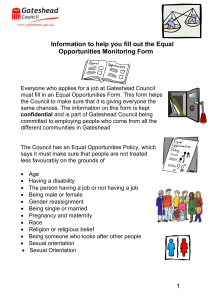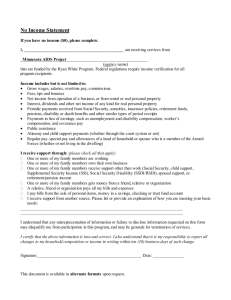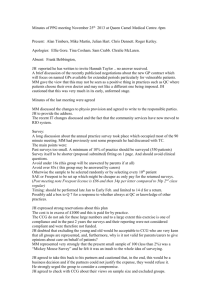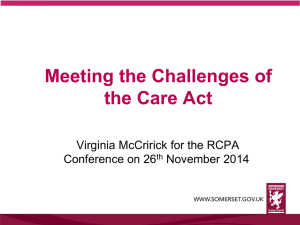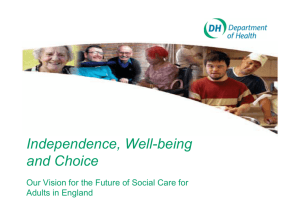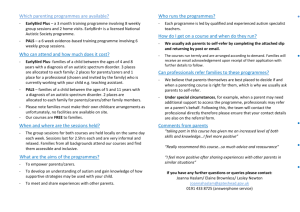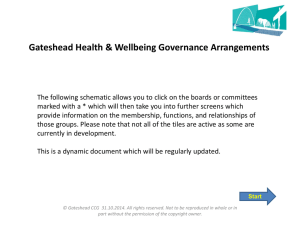Personal-Budgets - Gateshead Council
advertisement
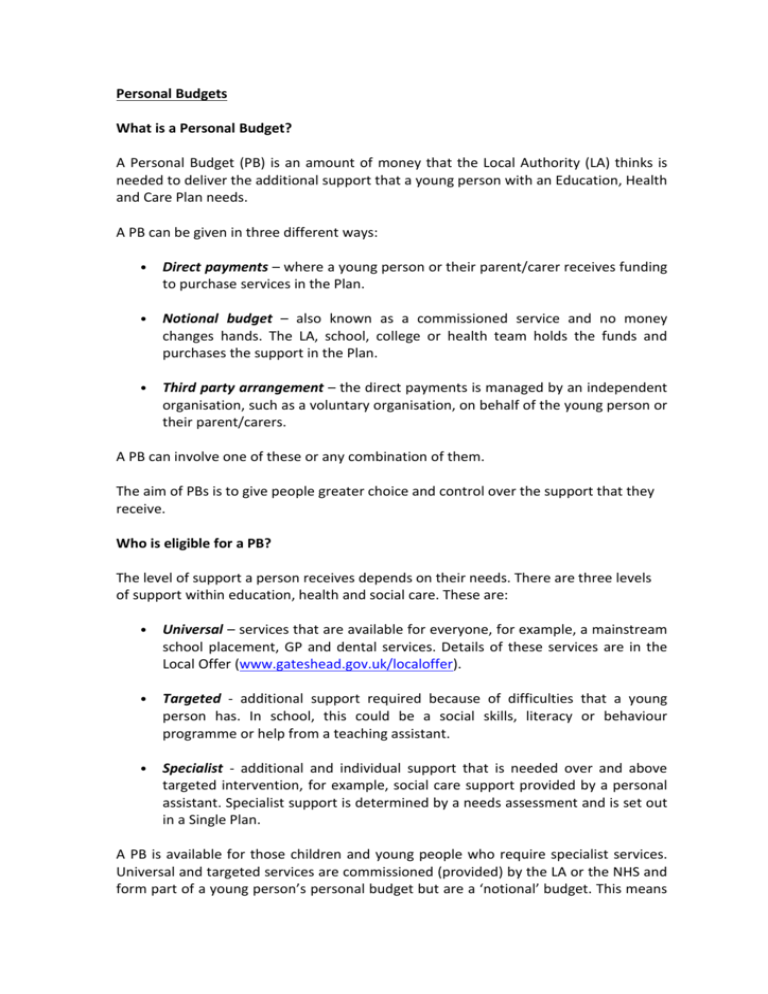
Personal Budgets What is a Personal Budget? A Personal Budget (PB) is an amount of money that the Local Authority (LA) thinks is needed to deliver the additional support that a young person with an Education, Health and Care Plan needs. A PB can be given in three different ways: • Direct payments – where a young person or their parent/carer receives funding to purchase services in the Plan. • Notional budget – also known as a commissioned service and no money changes hands. The LA, school, college or health team holds the funds and purchases the support in the Plan. • Third party arrangement – the direct payments is managed by an independent organisation, such as a voluntary organisation, on behalf of the young person or their parent/carers. A PB can involve one of these or any combination of them. The aim of PBs is to give people greater choice and control over the support that they receive. Who is eligible for a PB? The level of support a person receives depends on their needs. There are three levels of support within education, health and social care. These are: • Universal – services that are available for everyone, for example, a mainstream school placement, GP and dental services. Details of these services are in the Local Offer (www.gateshead.gov.uk/localoffer). • Targeted - additional support required because of difficulties that a young person has. In school, this could be a social skills, literacy or behaviour programme or help from a teaching assistant. • Specialist - additional and individual support that is needed over and above targeted intervention, for example, social care support provided by a personal assistant. Specialist support is determined by a needs assessment and is set out in a Single Plan. A PB is available for those children and young people who require specialist services. Universal and targeted services are commissioned (provided) by the LA or the NHS and form part of a young person’s personal budget but are a ‘notional’ budget. This means that the funds for these services cannot be used for a direct payment although, the costs for a number of targeted services can be identified the young person and parent/carer can know the total amount of support that is being funded by a notional budget. Where does personal budget funding come from? The diagram below shows where PBs can come from: Health High Needs Block I w Personal Budget School’s budget Social Care Education – the education setting that the young person attends already has funding to support their learning (see School Funding section for further information (link required)). These are notional budgets and cannot usually be used for a direct payment. In some circumstances the Head Teacher can choose to offer some of the school’s notional budget to support a young person’s needs, however, this is always the Head Teacher’s decision. If a young person’s has a Single Plan which identifies that they need a higher level of support than the notional SEN budget provides, the LA can make top up payments to the education setting. This is Element 3 (also known as High Needs Block) and can be made available for a direct payment but if parents/young person wants to purchase their own staff to provide support at an education setting, it can only be done with the agreement of the education provider. If the setting does not agree, the LA cannot make a direct payment. If home to school/college transport has been agreed, parents/carers/young people have the option of a PB instead of the LA providing transport. This is in addition to the High Needs Block funding. PBs are not available for something that the young person’s education setting already provides. This could mean that if a young person moves from a mainstream school to a special school, their PB changes as the special school provides a higher level of support. For example, a family may have a PB to access hydrotherapy for a child who attends a mainstream school but the PB would stop if they moved to a special school where hydrotherapy was provided as part of the curriculum. Health – most young people with special educational needs or a disability don’t need any more support from health services than other children, for example, GP, dental services, hospital and emergency treatment. There are a small number of young people who need support because they have complex health needs, long term and/or life limiting conditions. They might need support to breathe, need constant care to keep them healthy or have a condition such as epilepsy, which can’t be controlled with medication. These young people have ‘continuing care needs’ and need a ‘continuing care assessment’ in order to decide which services they need. When additional services are in place, they will be included in the young person’s Single Plan. Most families are happy for the services to be provided by Health but from October 2014, parents/carers and young people with a continuing care need have the right to ask for a PB. This means that they can manage the funding and take responsibility for support themselves. A nurse assessor will work with you to develop a support plan that describes whether you want to meet just some or all of your health needs with your Personal Budget and also what the desired outcomes will be. Social Care – a small number of young people with a special educational need or a disability receive support from the Disabled Children Team or the Transition’s Team. Families receive support for a number of reasons, for example, to help with their child’s personal care, to help around the home or short breaks so parents/carers can have a break from their caring role. In these circumstances, the family can ask for a PB instead of the LA providing services. If a child/young person has a Single Plan, details of additional services are provided either by the LA and health will be included the Plan as well as the cost of any direct payments. How do Direct Payments work? If you have been assessed as eligible for education, health or social care services you can choose whether you want to be responsible for buying some or all of the services in your child’s Single Plan that are eligible for a direct payment. You do not have to have a direct payment but if you do not want one, the Council and/or health services will organise these services for you. If you choose a direct payment, the first step will be to sign a written agreement which confirms that you know how the Direct Payment must be spent. It will tell you what your responsibilities are and what the Council’s responsibilities are to you. Please make sure that you understand what you are signing for. You must have a separate bank account for your Direct Payments to be made into and you must keep all the receipts. Funding will be given in monthly instalments. The account will be audited by the Council. You will have to pay back any unspent money at the end of the financial year and you will also have to pay back money if you’ve spent it on something that hasn’t been agreed. How can I get a PB? Children and young people have to be assessed by a professional in the relevant area before they can receive a PB. If the child/young person has a special education need or disability, they can be referred for an education, health and care (EHC) needs assessment. The referral is usually made by the child/young person’s educational setting but can also be made by parents/carers or the young person themselves (link to LO page). If you have a social worker, contact them to discuss whether you are eligible for a PB. If you haven’t got a social worker and want to be considered for a PB call the Council’s Referral and Assessment Team at Gateshead Council on 0191 4332410, 4332349, 4332505 or 4332653 for Children’s Services. New referrals to adult social care can be made by calling 0191 4337033 or by e-mail at adultsocialcaredirect@gateshead.gov.uk. Referrals for children’s continuing care are usually made by professional staff who are already working with your child with your consent. Please speak to a member of your child’s care team. Who makes the decision about PBs? If a child/young person has a Single Plan, the decision about education and social care funding is made by the SEND Panel. The Panel is made up of professional staff from education, health and social care as well as LA officers. Decisions about health support are made by the Clinical Commissioning Group (CCG). When a child/young person has a health need identified by the SEND Panel, the LA will confirm that the CCG agrees to provide the level of support that the Panel recommends before writing it into the Plan. If a child/young person does not have a Single Plan, the CCG will make a decision about the health funding available for a PB. Requests for a PB for children with social care needs will be made by the Disabled Children Resource Panel. Does the LA have to agree to my request for a PB? No, the LA can only agree to this if they are sure that: • You plan to use the Direct Payment in an appropriate way • You will act in the best interests of the child • Making the Direct Payment will not adversely impact upon other services provided to other children who have a Single Plan • It is an efficient use of the Local Authority’s resources. Where the support or service is to be used in an educational setting, the Head Teacher/Principal/Manager must agree. If they do not agree, the LA cannot make the payment. If the Local Authority refuses a Direct Payment they must explain their decision in writing and also explain to you how you can challenge this decision. If the refusal concerns the personal health part of the plan, then the explanation concerning the refusal must be sent out by the Clinical Commissioning Group who are the health organisation responsible for the decision. What happens if I get a PB but decide that it isn’t working? We will stop the direct payment and arrange for the commissioned services to meet the need. As it takes time to arrange commissioned services, we need at least 2 months’ notice that you want to stop your direct payment. Do you have to have a Single Plan to get a PB? No but a child/young person is only eligible for an education PB if they have an assessed special education need or disability - in other words, they have a Single Plan. If they have a Single Plan, details of any health and/or social care PB will also be included in the Single Plan. If a child/young person has no special educational need or disability but has been assessed as having health and/or social care needs they can still request direct payments as part of their assessment. Who can help me? The SEND Team can provide help about personal budgets. The Team can be contacted at SENteam@gateshead.gov.uk or on 0191 4333626. If you already have a personal budget for health or social care, your first point of contact should be your health Key Worker or social worker. More information about Personal Health Budgets can http://www.nhs.uk/choiceintheNHS/Yourchoices/personal-healthbudgets/Pages/managing-your-personal-health-budget.aspx need a link to Gateshead CCG information be found at
